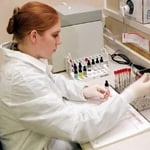Ron Hines DVM PhD
 See What Normal Blood & Urine Values Are
See What Normal Blood & Urine Values Are
 Causes Of Most Abnormal Blood & Urine Tests
Causes Of Most Abnormal Blood & Urine Tests
Your Pet’s Mean Corpuscular Hemoglobin Concentration = MCHC
Your pet’s Mean Corpuscular Hemoglobin Concentration (MCHC) is the average hemoglobin concentration in each of its red blood cells. It is your pet’s hemoglobin concentration value x 100 divided by its hematocrit (Hct = PCV) value.
Reasons Why Your Pet’s MCHC Might Be Low (Hypochromic Anemia):
Low MCHC can happen after your pet has lost sizable amounts of blood when its body is forced to replace large numbers of lost red blood cells and still has the capacity to do so (a regenerative anemia). Those RBCs are often immature (reticulocytes) and somewhat larger than normal, and they may not contain normal amounts of hemoglobin which is what accounts for the low MCHC.
Low MCHC can also occur when your pet has insufficient iron stores (iron deficiency microcytic anemia). In puppies and kittens, severe hookworm or flea infections can be responsible for that. Older strays that must subsist on whatever food they can scavenge have the same risk.
Low MCHC can also occur during chronic inflammatory diseases and infections of many kinds as well as some cancers.
Chronic intestinal problems that affect the pet’s ability to absorb nutrients, liver problems, and abnormal blood circulation (portosystemic shunts) can also limit the amount of iron that the pet absorbs and lower its MCHC and MCV.
Some of the older automated laboratory analysis systems will give falsely low MCHC readings when the blood in samples are clumped, partially clotted or agglutinated. Extended storage can also decrease MCHC readings.
Reasons Why Your Pet’s MCHC Might Be High:
This is usually due to inadvertently drawing or submitting a hemolyzed blood sample, A lipemic blood sample can also falsely raise your pet’s hemoglobin readings, leading to an artifact (not real, inaccurate) MCHC high reading as well. I know of no real causes.
Complementary Tests:
CBC/ WBC, blood chemistry panel including bilirubin level, reticulocyte count, TIBC, bile acids, folate levels, fecal flotation for parasites, further tests chosen by your veterinarian based on those results.
DxMe
You are on the Vetspace animal health website
Visiting the products that you see displayed on this website help pay the cost of keeping these articles on the Internet.


